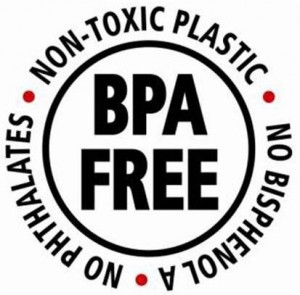 The U.S. Food and Drug Administration decided not to ban the chemical bisphenol A, also known as BPA, in food packaging last week. The decision may seem like a surprising one since so many water bottles and serving utensils are sold as “BPA-free.” So let’s look at the evidence behind their decision.
The U.S. Food and Drug Administration decided not to ban the chemical bisphenol A, also known as BPA, in food packaging last week. The decision may seem like a surprising one since so many water bottles and serving utensils are sold as “BPA-free.” So let’s look at the evidence behind their decision.
National Public Radio offered a good overview of the evidence available on the health effect of BPA. The story noted that evidence from government agencies typically weighs heavier in FDA decisions.
One worry with other studies in contamination – BPA accidentally getting into the blood after samples are drawn. Some studies have found high levels of BPA in the blood. But these studies used samples collected in hospitals or doctors’ offices, not research settings and did not include a common test to detect contamination.
One study performed by government scientists involved feeding 20 adults a diet high in BPA from packaged foods for a day, and then measuring how much of it ended up in their blood. At the end of the day, there wasn’t enough BPA in participants’ blood to measure.
That’s because the human body can he human body can actually inactivate dangerous chemicals like BPA in the intestine and liver, Justin Teeguarden, a toxicologist at the Pacific Northwest National Lab who conducted the study, told NPR. Contamination was also an issue in this study, but the researchers tested for it and overcame it, he said.
Other government studies found that very little BPA is transferred to a nursing mother’s breast milk, and that newborn monkeys are able to inactivate BPA just like human adults. (Researchers aren’t able to conduct studies on newborn babies.)
While the evidence does not show that BPA is completely safe, the FDA found that the low levels of BPA that humans are safe.
As for me, I’m still going to avoid BPA when I can. With the pressure on companies to remove from their products, there are plenty of BPA-free alternatives available, especially for kids. Any other BPA from canned food or juice containers, I’m not going to worry about for the moment.



The comments under Jon Hamilton’s report on the NPR link above are much more relevant than the article itself. Lot’s of BPA followers and actual BPA researchers have commented. Follow the money. There is just too much commerce that uses BPA for it to be abruptly banned. All the US government feels capable of doing is “warning shots” to let industry know that the search for alternatives had better be accelerated. Look around the world. Japan started its bans on various uses of BPA in the late 1990s when their researchers started seeing effects everywhere. Don’t believe that so many whole countries would ban the substance based on bad or faulty science. The Teeguarden study is convenient for industry, but flies in the face of so many other studies.